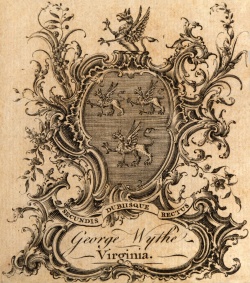Les Reports des Divers Special Cases
Les Reports Des Divers Special Cases: Adjudge en Le Court Del Common Bank en Les Reignes de Les Tres Hault & Excellent Princes Hen. VIII. Edw. VI. Et Les Reignes Mar. & Eliz
by William Dalison
| Dalison's Reports | ||
|
at the College of William & Mary. |
||
| Author | William Dalison | |
| Date | 1689 | |
| Edition | First | |
| Language | French | |
William Dalison (d. 1559) was a seventeenth century judge and law reporter. He was the second son of William Dalison of Lincolnshire, who was also in the legal profession. After following his father to Gray’s Inn in 1534, Dalison’s career began a rapid ascent. He was called to the bar by as early as 1537, and became a reader by 1548. As his career progressed he developed a reputation for being a being a very learned lawyer.[1] In October of 1552 he became a sarjeant at law, at which time he was still likely under the age of forty. In November of 1552 he was made a judge on the queen’s bench and was reappointed to that position after Mary I’s death in 1558. He served one more term before passing away in January of 1559.[2]
In addition to his legal duties, Dalison was elected representative of Lincoln county in the parliament in 1554.[3]
Les Reports des Divers Special Cases is a court reporter covering many of the cases presided over by William Dalison, a justice of the queen’s bench during the reigns of Mary I and briefly Elizabeth I. Some of the cases reported are from before his appointment, including several from the reigns of Henry VIII and Edward VI.[4]. It includes a large collection of cases argued in closed sessions of Sarjeants’ Inn.[5] One of these cases is amongst the earliest references to a judicial decision on the authority of royal proclamations on record [6] Several of the cases reported are landmark decisions in the history of criminal law.[7] Dalison’s case reports, when read in conjunction with the reports of other contemporary judges, were considered to be a valuable record of the cases of his time.[8] It should be noted that Dalison’s authorship of the work is somewhat questionable, as several of the cases reported occurred after his death.[9] Scholars suggest the case reports were authored by Dalison or fellow judge Richard Harpur, who died in 1577.[10]. Additionally, Harpur’s own reports were often mixed with Dalison’s in the printed versions of their reports, meaning that even the authorship of the cases during Dalison’s lifetime cannot be fully verified.[11]
Evidence for Inclusion in Wythe's Library
References
- ↑ Edward Foss, The Judges of England with Sketches of Their Lives, and Miscellaneous Notices Connected with the Courts at Westminster, from the Time of the Conquest (London : Longman, Brown, Green and Longmans ... [et al.], 1848-1864; repr., Clark, New Jersey: The Lawbook Exchange, 2003) 5:478-479.
- ↑ J. H. Baker, "Dalison, William (d. 1559)," Oxford Dictionary of National Biography (Oxford University Press, 2004- ), accessed 4 March 2015.
- ↑ Foss, The Judges of England with Sketches of Their Lives, 5:478.
- ↑ J. G. Marvin, A Thesaurus of American, English, Irish, and Scotch Law Books (Philadelphia, Pennsylvania: T. and J. W. Johnson, Law Booksellers, 1847), 249.
- ↑ Baker, "Dalison, William (d. 1559)."
- ↑ Rudolph W. Heinze, The Proclamations of the Tudor Kings (Cambridge: Cambridge University Press, 1976), 37.
- ↑ Baker, "Dalison, William (d. 1559)."
- ↑ Foss, The Judges of England with Sketches of Their Lives, 5:479.
- ↑ J. H. Baker, "Dalison, William (d. 1559)."
- ↑ Ibid.
- ↑ Ibid.
